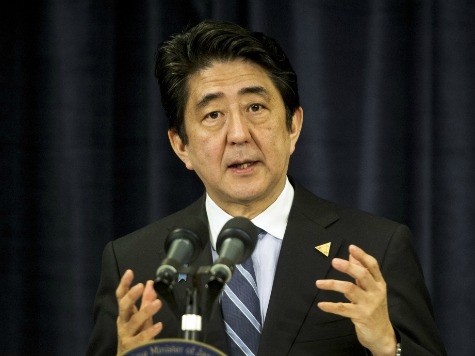
In an interview with Spanish newspaper ABC, Japanese Prime Minister Shinzo Abe described the crisis in Ukraine as “a global problem concerning Asia,” one which he intends his government to be heavily involved in solving.
Abe, who is in Spain for talks with Spanish President Mariano Rajoy as part of a larger European tour, responded to whether he considered Ukraine a significant problem for Japan with a clarification that Japan intends to be involved in the resolution of the nation’s dispute with Russia. “I would like to reiterate first of all that we cannot allow a change in the status quo of a nation by force,” he told the paper, adding that “the situation in Ukraine is not just something that affects Europe, but it is a matter of a global problem that also concerns Asia.” Japan, he added, has “established help for the recovery of their economy and of democratic principles, as well as integration and dialogue.”
In a tour of Germany last week, Abe reiterated those statements as he and German Chancellor Angela Merkel promised their countries would continue to impose sanctions on Russia until peace reigned in Ukraine.
Abe also answered questions relating to territorial disputes with Russia. Japan has some experience with that, as Russia claims the Kuril Islands, which stretch off the coast of Hokkaido. “I trust in dialogue; I always bet on dialogue, for Ukraine as much as to solve any other conflict,” he said of the dispute. He added that he expects that dialogue will “advance Russian-Japanese relations” in a way that could “harmonize our national interests.”
With regards to China he responded similarly, though he reminded the interviewer, in some sense, that China had more to lose from tensions with Japan than vice versa. The countries are also involved in a dispute involving the uninhabited Senkaku Islands, which China claims as the Diaoyu. “Besides Japanese corporations being the majority in China, this country, in turn, imports semi-manufactured products, that can only be fabricated in Japan, to export them subsequently as manufactured products,” Abe explained. He hoped the countries could arrive at a “mutually beneficial relationship based on common strategic interests.”
The full interview with Abe is (in Spanish) here.
In addition to promoting business interests in the region, Abe has begun discussions on changing the Japanese Constitution, which currently does not allow the nation to have a standing army, but only self-defense forces. The standing army, supporters contend, would strengthen a United States ally that must contend with volatile neighbors like North Korea, Russia, and China. That discussion has led Chinese news outlet Xinhua to campaign against Abe as an “irresponsible,” “dangerous” right-wing zealot who seeks war with China.

COMMENTS
Please let us know if you're having issues with commenting.